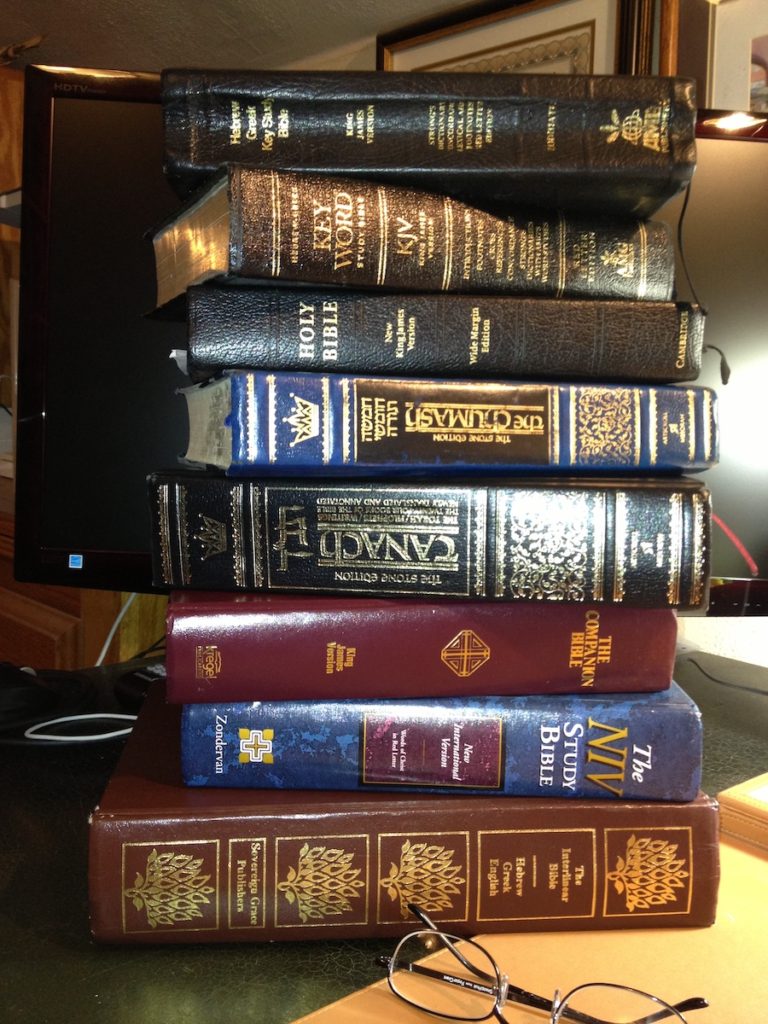
Continually, people ask me what Bible translation I personally use when preaching and when writing. I wish there were a good answer to this question, but there isn’t. I’ve been asked this question many times over the years. The short answer is all of them and none of them. Let me explain what I mean.
The Word of Elohim is something I take very seriously. It is something to be trembled before with a contrite heart (Isa 66:2). Sadly, there are numerous designer Messianic Bibles out there being peddled by money-grubbing charlatans or self-proclaimed experts who have just enough knowledge of the original languages to be dangerous, but not enough to competently translate a Bible. These individuals are duping those who know less than they do, and preying unsuspecting and naive people who are hungry for truth. They are proving the old adage that says “an ‘expert’ is simply someone who knows more than the next guy.” Most of these “translators” have little or no academic training or linguistic expertise in ancient biblical languages, yet this doesn’t stop them producing a constant stream of “new and improved” Bible translations. I actually have some academic background in foreign and biblical languages and have done translating work in both French and Koine Greek at the academic level, so I speak with some understanding on the subject. Yet, I am not an expert, and am not qualified to translate anything.
There is not a single Bible translation on the market today that I can unreservedly recommend. Some of the more popular ones have been translated by questionable individuals who have little or no linguistic training, yet they (dishonestly) refuse to disclose publicly what their qualifications are for translating the Bible. I find this to be a huge red flag to me. If you have linguistic qualifications, why not state them? If you don’t, it’s probably because you have none. I suspect that most of these self-proclaimed Bible translators simply sat down with a copyright free English version (e.g. the KJV) and along with the help of a concordance and a few other lexical aids, made a translation, which they now peddle for big bucks. This is dishonest and unrighteous.
Which Bible version do I personally use? I still use the KJV and NKJV, since at least they were translated by competent linguists. Because I’ve been studying Greek and Hebrew for more than 45 years, I know where all the translation biases are, and I know the Hebrew and Greek words behind many of the English words in our Bibles. As I’m reading the Bible (when preaching) or quoting (when writing), I start with the base of the NKJV, and as I am going along, I “clean” up the English. For example, I insert Hebrew words for the names of deity (i.e., God becomes Elohim, LORD become Yehovah, Jesus becomes Yeshuah, Christ becomes Messiah, Holy Spirit become Ruach HaKodesh, and so on). In cases where there are Hebrew or Greek words that the translators have translated into English using misleading words, based on the lexical meanings of the words I make changes. For example, in Romans 10:4, I change “end” to “final aim, goal.” This is totally consistent not only with the meaning of the Greek word telos but also consistent with biblical truth. Another example would be Matthew 5:17 where fulfill (Gr. pleroo) means “to fill up, to make full, to complete, to fill to the top.” In any place in both the Tanakh (Old Testament) or the Testimony of Yeshua (New Testament) where the word law occurs in referring to “the law of Moses”, I replace it with the Hebrew word Torah meaning “instructions, teachings and precepts [in righteousness of YHVH Elohim].” I could give many other examples, but hopefully the reader gets the point. I don’t carelessly or haphazardly substitute words, but do so full well recognizing the meanings of the words in the original languages, and how the biblical authors use them in the full context of the whole Bible. Again, I tremble before YHVH and his Word, I cringe at the thought of being labeled a false teacher, or bringing curses upon myself for adding or subtracting from the Word of Elohim.


